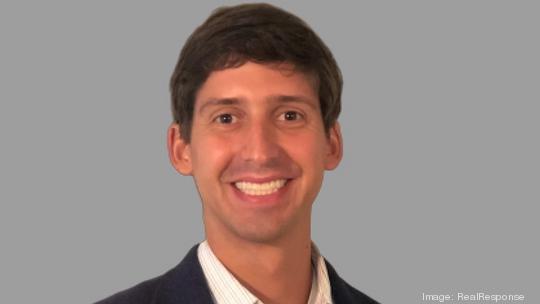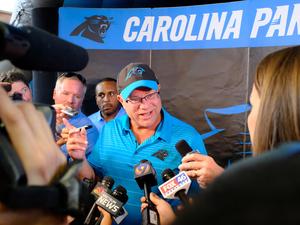
Seated at a table outside a local coffee shop, David Chadwick, the founder of Charlotte-based RealResponse, needed next to no time to respond last week when asked about his company’s next challenge.
“Scaling,” he said. “It’s getting from, as the founder, my tentacles being in every aspect of the business, to having processes and people in place that can manage and grow things in their own respective domains.”
Chadwick, 32, started RealResponse, an anonymous digital communication tool for student-athletes, in 2015 as part of a class project while finishing his college basketball career at Valparaiso University in Indiana.
He knew the territory well. Chadwick, who is 6-9 and the son of a former basketball player at UNC Chapel Hill, first played in college at Rice University, where he saw a scandal unfold over alleged discrimination against two of his teammates.

The lack of ability for student-athletes to anonymously report their concerns, and lack of direct access to potential abuses or other concerns among administrators, resonated with Chadwick as a widespread problem in need of a solution. What began as RealRecruit eventually morphed into RealResponse, driven by surging concerns about mental health, growing awareness of harassment, assault and other concerns, and monitoring the more quotidian aspects of college sports (travel conditions, training table food, weight rooms and so on).
As his college basketball career wound down, Chadwick began pursuing the possibility of selling subscriptions to athletic departments for what became RealResponse. Over several years, he spoke to 200 athletic directors, many of them in face-to-face meetings.
Chadwick took on the challenges of becoming an entrepreneur as a newlywed and moved with his wife to his parents’ Charlotte home as he started the venture. What he thought would be a few months living at home became a few years, but the results have been impressive. (He’s long since moved out, and he and his wife have two young children with a third expected this fall.)
RealResponse began ringing up sales to college athletic departments in 2016 and was profitable in a short amount of time, Chadwick told CBJ. The privately held company does not disclose financial figures.
Start-up costs were $500,000, mostly funded by family and friends, Chadwick said. And he emphasized that most of the start-up funding came after RealResponse had begun generating sales.
The company has 10 employees, including Chadwick, the founder and CEO. Its client roster includes athletic departments at 100 colleges, most of whom subscribe on a yearly or multi-year basis. Fees vary widely depending on the service and number of users. Chadwick told CBJ that the average client spends $1,000 to $10,000 per month on the service.
“If there’s someone who’s not having a good experience, for whatever reason, we want to know about it so we can work on making the experience we provide even better,” Wake Forest Athletic Director John Currie told me, referring to the school’s use of RealResponse.
Currie noted that Wake Forest has 415 student-athletes, making a constantly available, anonymous and direct communication system valuable. He and other athletic administrators said they view RealResponse as a tool for addressing serious problems as early as possible — and with the chance to steer students to additional help immediately — as well as a way of keeping tabs on what’s working and what’s not across the board.
“It runs the gamut from negative to positive, but the majority of the feedback is positive,” UNC Charlotte AD Mike Hill told CBJ. “What it does is provide an opportunity for a student-athlete to notify us or let us know when something is off.”
Hill first learned of Chadwick’s venture when Hill worked in the athletic department at the University of Florida. Upon becoming Charlotte AD in 2018, Hill inherited a contract with RealResponse that was subsequently extended as he saw the value of the system.
In addition to the anonymous reporting of issues large and small, and the chance to take immediate steps to address problems, Hill likes RealResponse’s data and analysis tools, which provide comparative satisfaction scores on a range of issues among sports and other participating schools.
In the past two years, RealResponse has expanded beyond its college sports roots. The company added the NFL Players Association as a client in 2020 in an agreement aimed at strengthening communication about Covid-19 health concerns and protocols. Last year, the NFLPA expanded the partnership to encompass all health and safety concerns.
Last month, USA Track and Field became the latest national governing body to add RealResponse as a way of combating abuse of athletes. USA Gymnastics, which paid a $380 million settlement with the U.S. Olympic Committee to settle a sexual abuse scandal perpetrated by a former team doctor, has added the anonymous reporting system to better protect its athletes. Other new clients include the National Women’s Soccer League, which endured scandal and negative headlines over harassment in 2021, and the U.S. Anti-Doping Agency.
Several NFL teams have turned to RealResponse to provide employees a reporting system. Players are covered through the NFLPA partnership, but front-office administrators are not.
Kirsten Krug, executive vice president of administration with the Kansas City Chiefs, said the NFL franchise added RealResponse last month as a way of ensuring all 263 full-time staffers have “a confidential, anonymous resource to report issues or concerns.” Krug said confidential feedback and communication are valuable for any workplace environment.
The use of RealResponse as a human resources tool beyond college sports could provide entrée to a broad range of prospective clients.
Chadwick said the company could grow to 15 to 20 employees by the end of this year as part of the scaling up that’s preoccupying him these days.
Samantha Huge, a former athletic director at William & Mary, joined RealResponse last year. Chadwick said Huge brings credibility to RealResponse because she spent two decades in college sports and has first-hand experience of the challenges reaching student-athletes and getting them to speak up without fear of retaliation or other concerns, whether perceived or real.
To be able to respond and offer help and ask questions with a guarantee of anonymity makes a powerful statement, Huge told me. Many colleges have 350 to 900 student-athletes on campus at a time, making it all but impossible to keep up with everyone’s experiences on an anecdotal or annual survey basis.
And, she added, that kind of communication is as valuable to a Fortune 500 company or other parts of a university as it is for an athletic department.
“It really can be utilized by so many different entities on a college campus,” she said.
You might say it’s all about scaling up.








